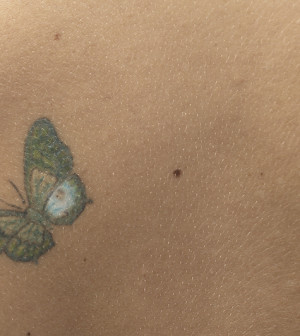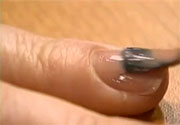- The Best Time of Day to Drink Bone Broth to Maximize Health Benefits
- 8 Ways to Increase Dopamine Naturally
- 7 Best Breads for Maintaining Stable Blood Sugar
- Gelatin vs. Collagen: Which is Best for Skin, Nails, and Joints?
- The Long-Term Effects of Daily Turmeric Supplements on Liver Health
- Could Your Grocery Store Meat Be Causing Recurring UTIs?
- Are You Making This Expensive Thermostat Error This Winter?
- Recognizing the Signs of Hypothyroidism
- 10 Strategies to Overcome Insomnia
- Could Artificial Sweeteners Be Aging the Brain Faster?
Kicking the Nail-Biting Habit


Maybe it’s time to listen to your mother’s words and stop biting your nails. That’s because nail-biting isn’t just an unattractive habit, it can also lead to strange-looking nails and even skin infections, a dermatologist warns.
“Chronic nail-biting can cause serious problems,” dermatologist Dr. Margaret Parsons, an associate clinical professor of dermatology at the University of California, Davis, said in a news release from the American Academy of Dermatology.
“In addition to making the skin around your nails feel sore, repeated nail-biting can damage the tissue that makes nails grow, resulting in abnormal-looking nails,” she said. “It can also leave you vulnerable to infection as you pass harmful bacteria and viruses from your mouth to your fingers and from your nails to your face and mouth.”
To cut down on the problem, Parsons suggested avoiding temptation by keeping your nails trimmed short.
She also recommended applying bitter-tasting nail polish, getting regular manicures or wearing gloves.
Replacing the habit with another activity — such as squeezing a stress ball — is another option, Parsons added.
Some people might fare best by starting slowly, she said, focusing, for example, on leaving alone the thumbs before gradually expanding to include the rest of the hand over time.
But more generally, Parsons advocated trying to tackle the general underlying cause of the habit, whether it’s stress, boredom or anxiety.
“For some people, nail-biting may be a sign of a more serious psychological or emotional problem,” Parsons said. “If you’ve repeatedly tried to quit and the problem persists, consult a doctor. If you bite your nails and develop a skin or nail infection, consult a board-certified dermatologist.”
More information
Learn more about nails from the American Academy of Dermatology.
Source: HealthDay
Copyright © 2026 HealthDay. All rights reserved.










